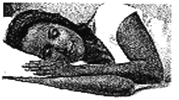
ЁОЬтФПЁПЭъаЮЬюПеЃЌдФЖСЯТУцЕФЖЬЮФЃЌеЦЮеЦфДѓвтЃЌШЛКѓДгЖЬЮФКѓИїЬтЫљИјЕФAЁЂBЁЂCЁЂDЫФИібЁЯюжаЃЌбЁдёзюМббЁЯюЁЃ
One day Mrs. Smith was sitting in her doctorЁЏs waiting room when a young boy and his mother entered the office. The young boy caught Mrs. SmithЁЏs attention _________he wore a patch over one eye. She felt _________ at how natural he seemed to be even though he lost one of his eyes.
The doctorЁЏs office was very busy that day, so Mrs. Smith had an opportunity to have a chat with the boyЁЏs mother while he played with his toy soldiers.
In the end, Mrs. Smith took the chance to ask the little boy what had happened to his eye. He _________ her question for a long moment, and then replied, lifting the patch, ЁАThereЁЏs nothing wrong with my eye. IЁЏm a pirate (КЃЕС)!ЁБ Then he returned to his _________ .
Mrs. Smith was there because she had lost her leg from the knee down in a car accident. Her 35 today was to check whether it had been OK enough to be fitted with a prosthetic (МйжЋ). The loss had been _________ to her. Try as she would to be brave, she felt like a disabled fool. She knew that this loss should not have a bad effect on her life, but emotionally, she could not get out of the fear and sadness.
The word ЁАpirateЁБ changed her life. Immediately, she saw herself dressed as Long John Silver, a famous pirate, standing aboard a pirate ship. She stood with her legs planted wide apart. The ship rocked under the stormЁЏs force. _________she stood firmly (ЮШЙЬЕи). She smiled into a storm.
At that moment, the disabled image was replaced and her courage _________.
She regarded the young boy with respect, who was just busy with his soldiers.
A few minutes later, the nurse called her. As she _________ on her crutches, the
boy noticed her leg. ЁАHey lady,ЁБ he called, ЁАWhatЁЏs wrong with your leg?ЁБ the young boyЁЏs mother felt very sorry for her sonЁЏs question.
Mrs. Smith looked down at her shortened leg for a moment. Then she replied with a smile, ЁАNothing. IЁЏm a _________ , too.ЁБ

ЁО1ЁПA. however B. because C. so D. although
ЁО2ЁПA. bored B. angry C. surprised D. tired
ЁО3ЁПA. answered B. described C. explained D. considered
ЁО4ЁПA. game B. choice C. action D. course
ЁО5ЁПA. dream B. direction C. trip D. prediction
ЁО6ЁПA. terrible B. lucky C. normal D. natural
ЁО7ЁПA. Hardly B. Still C. Ever D. Never
ЁО8ЁПA. developed B. broke C. lost D. returned
ЁО9ЁПA. balanced B. fell C. fixed D. knocked
ЁО10ЁПA. solider B. doctor C. mother D. pirate
ЁОД№АИЁП
ЁО1ЁПB
ЁО2ЁПC
ЁО3ЁПD
ЁО4ЁПA
ЁО5ЁПC
ЁО6ЁПA
ЁО7ЁПB
ЁО8ЁПD
ЁО9ЁПA
ЁО10ЁПD
ЁОНтЮіЁП
ЪдЬтЗжЮіЃКЙЪЪТЗЂЩњдквНЩњЕФКђеяЪвРяЁЃЪЗУмЫЙЗђШЫЕФЭШдквЛДЮГЕЛіжаЪмЩЫСЫЃЌЫ§ШЅвНдКНгЪмжЮСЦЃЌдкКђеяЪвРяЃЌгіМћСЫвЛИіДјзХблежЕФКЃЕСФаКЂЁЃФаКЂЕФОЋЩёЩюЩюЕФДђЖЏСЫЪЗУмЫЙЗђШЫЃЌШУЫ§жиаТЙФЦ№СЫЩњЛюЕФгТЦјЁЃ
ЁО1ЁПBПМВщСЌДЪМАгяОГРэНтЁЃОфвтЃКетИіаЁФаКЂв§Ц№СЫЪЗУмЫЙЬЋЬЋЕФзЂвтЃЌвђЮЊЫћЕФвЛжЛблОІЩЯДїзХблежЁЃA. howeverВЛЙ§ЃЌПЩЪЧЃЛB. becauseвђЮЊЃЛC. so вђДЫЃЛD. althoughОЁЙмЁЃ НсКЯгяОГРэНтЃЌЩЯЯТОфЪЧвђЙћЙиЯЕЃЌЙЪД№АИЮЊBЁЃ
ЁО2ЁПCПМВщаЮШнДЪМАгяОГРэНтЁЃОфвтЃКШУЪЗУмЫЙЬЋЬЋИаЕНОЊЦцЕФЪЧЃЌетИіаЁФаКЂЫЦКѕВЂУЛгавђЮЊЪЇШЅвЛжЛблОІЖјЪмЕНЪВУДгАЯьЁЃA. bored ЮоСФЕФЃЛB. angryЩњЦјЕФЃЛC. surprisedГдОЊЕФЃЛD. tired ЦЃРЭЕФЁЃbe surprise at sth.ЖдФГЪТИаЕНГдОЊЃЌbeвВПЩвдЛЛГЩfeel,ДЫДІЪЧЙ§ШЅЪБЃЌЪЗУмЫЙЗђШЫГдОЊгкаЁФаКЂЕФЬЙШЛЁЃЙЪД№АИЮЊCЁЃ
ЁО3ЁПDПМВщЖЏДЪМАгяОГРэНтЁЃОфвтЃКаЁФаКЂЯыСЫКУвЛЛсЖљЃЌВХЬЇЦ№ЭЗЃЌЯЦЦ№блежЁЃA. answeredЛиД№ЃЛB. describedУшЪіЃЛC. explainedНтЪЭЃЛD. considered ПМТЧЃЌЫМПМЁЃЯТЮФжаГіЯжЕФrepliedЃЌАДееГЃРэЪЧдкЩюЫМЪьТЧКѓЕФЛиД№ЃЌЙЪД№АИЮЊDЁЃ
ЁО4ЁПAПМВщУћДЪМАгяОГРэНтЁЃОфвтЃКД№ЕРЃКЁАЮвЕФблОІУЛЪВУДАЁЃЁЮвЪЧвЛИіКЃЕСЃЁЁБЫЕЭъЃЌгжЕЭЯТЭЗНгзХЭцЫћЕФгЮЯЗШЅСЫЁЃA. gameгЮЯЗЃЛB. choiceбЁдёЃЛC. actionааЖЏЃЛD. course ПЦФПЃЌПЮГЬЁЃЩЯЮФжадјЬсЕНhe played with his toy soldiers.аЁФаКЂдкЛиД№ЭъЮЪЬтКѓЃЌгІИУЪЧжиаТЛиЕНгЮЯЗжаЃЌД№АИЮЊAЁЃ
ЁО5ЁПCПМВщУћДЪМАгяОГРэНтЁЃОфвтЃКЯждкЃЌЫ§ДЫааЕФФПЕФЪЧШУвНЩњИјЫ§зіМьВщЃЌПДПДЩЫПкЪЧЗёШЌгњЃЌвдБузАЩЯМйжЋЁЃA. dream УЮЯыЃЛB. directionЗНЯђЃЛC. trip ТУааЃЛD. prediction дЄбдЁЃЩЯЮФвбОНЛДњСЫЪЗУмЫЙЗђШЫРДвНдКжЮСЦздМКЪмЩЫЕФЭШЁЃЙЪД№АИЮЊCЁЃ
ЁО6ЁПAПМВщаЮШнДЪМАгяОГРэНтЁЃОфвтЃКетДЮЫ№ЪЇЖдЫ§МђжБЬЋПЩХТСЫЁЃA. terribleПЩХТЕФЃЛB. luckyавдЫЕФЃЛC. normal е§ГЃЕФ;D. naturalздШЛЕФЁЃ ИљОнЯТЮФжаЕФОфзгЁАshe could not get out of the fear and sadness.ЁБПЩжЊЃЌНижЋИјЫ§ДјРДЕФДђЛїМђжБЬЋПЩХТСЫЁЃД№АИЮЊAЁЃ
ЁО7ЁПBПМВщИБДЪМАгяОГРэНтЁЃОфвтЃКЫ§ШдШЛЮШЮШЕивйСЂдкДЌЭЗЃЌЮЂаІзХУцЖдПёЗчБЉгъЕФЯДРёЁЃA. HardlyМИКѕВЛЃЛB. StillШдШЛЃЛC. Ever дјОЃЛD. Never ДгВЛЁЃНсКЯЩЯЯТОфОфвтРэНтЃЌЧАКѓБэЪОзЊелЙиЯЕЃЌЙЪбЁBЁЃ
ЁО8ЁПDПМВщЖЏДЪМАгяОГРэНтЁЃОфвтЃКОЭдкФЧвЛПЬЃЌЫ§ФдКЃжадЯШФЧИіВаЗЯЕФаЮЯѓЖйЪБЯћЪЇЕУЮогАЮозйСЫЃЌЫ§гжжиаТЙФЦ№СЫгТЦјЁЃA. developedЗЂеЙЃЛ B. broke ДђЫщЃЛC. lost ЖЊЪЇЃЛD. returnedЗЕЛиЃЌЙщЛЙЁЃЩЯЮФЬсЕНЫ§ЮоЗЈАкЭбПжОхКЭБЏЩЫЁЃДЫПЬЫ§ЪмЕНСЫаЁФаКЂЕФЙФЮшЃЌжиаТЙФЦ№СЫгТЦјЃЌЙЪД№АИбЁDЁЃ
ЁО9ЁПAПМВщЖЏДЪМАгяОГРэНтЁЃОфвтЃКЕБЫ§жєзХЙееШеОЦ№ЩэРДЕФЪБКђЁЃA. balancedЦНКтЃЛB. fellЕєЯТЃЌЫЄЕЙЃЛC. fixed аоРэЃЛD. knockedЧУДђЁЃНсКЯгяОГРэНтЃЌгУЙееШБЃГжЦНКтЃЌЗћКЯЮФвтЃЌД№АИЮЊAЁЃ
ЁО10ЁПDПМВщУћДЪМАгяОГРэНтЁЃОфвтЃКЁАУЛЪВУДАЁЃЌЮввВЪЧвЛИіКЃЕСЃЁЁБ A. solider ЪПБјЃЛB. doctorвНЩњЃЛC. motherТшТшЃЛD. pirateКЃЕСЁЃНсКЯЧАЮФаЁФаКЂЕФЛиД№ЁАThereЁЏs nothing wrong with my eye. IЁЏm a pirate (КЃЕС)!ЁБПЩжЊЃЌД№АИЮЊDЁЃ



| ФъМЖ | ИпжаПЮГЬ | ФъМЖ | ГѕжаПЮГЬ |
| ИпвЛ | ИпвЛУтЗбПЮГЬЭЦМіЃЁ | ГѕвЛ | ГѕвЛУтЗбПЮГЬЭЦМіЃЁ |
| ИпЖў | ИпЖўУтЗбПЮГЬЭЦМіЃЁ | ГѕЖў | ГѕЖўУтЗбПЮГЬЭЦМіЃЁ |
| ИпШ§ | ИпШ§УтЗбПЮГЬЭЦМіЃЁ | ГѕШ§ | ГѕШ§УтЗбПЮГЬЭЦМіЃЁ |
ПЦФПЃКГѕжагЂгя РДдДЃК ЬтаЭЃК
ЁОЬтФПЁП
On May 24, Theresa May gave a public speech outside Downing Street. She made the decision to resignЃЈДЧжАЃЉas the UK's prime ministerЃЈЪзЯрЃЉafter failing to pass Brexit- a plan to separateЃЈЪЙЭбРыЃЉthe UK from the European Union (EU).
May broke down in tears as she finished her speech. Many people have wondered what sheЁЏs like in her personal life.
May, who was born in 1956, is the UK's second femaleЃЈХЎадЕФЃЉprime minister after Margaret Thatcher. She had to overcome many challenges to get to this position. When she was a child, she dreamed about becoming the first female prime minister of Britain. One of her childhood friends told reporters that she had gotten angry when Thatcher became the first female prime minister before her.
May studied geography at Oxford University. After graduating, she worked in the bank. In 1997 she was electedЃЈбЁОйЃЉas a member of ParliamentЃЈвщЛсЃЉ.
In June 2016, the prime minister (ЧАЪзЯрЃЉDavid Cameron decided to leave the business of Brexit behind him for May to deal with.
When May became prime minister, she was ambitiousЃЈгаалаФЕФЃЉabout Brexit. However, she felt tired after many failed talks with the EU.
Still, I am very inspired by May. She is a strong woman who fought hard to make good deals ЃЈНЛвзЃЉwith the EU. Although she failed most of the time, she still got up and carried on. She will go down in history.
ЁО1ЁПWhen did Theresa May gave her resignation speech?
_______________________________________________________________________
ЁО2ЁПDid Theresa May cry when she finished her speech?
_______________________________________________________________________
ЁО3ЁПWho is the first female prime minister of the UK?
_______________________________________________________________________
ЁО4ЁПHow old is May when she was elected as a member of Parliament?
_______________________________________________________________________
ЁО5ЁПWhy did May feel tired?
_______________________________________________________________________
ВщПДД№АИКЭНтЮі>>
ПЦФПЃКГѕжагЂгя РДдДЃК ЬтаЭЃК
ЁОЬтФПЁПЁО2014ФъЩНЖЋЪЁЭўКЃЪажаПМЁПWhy not look up the new word in a dictionary you donЁЏt know it?
A. if B. that C. though D. whether
ВщПДД№АИКЭНтЮі>>
ПЦФПЃКГѕжагЂгя РДдДЃК ЬтаЭЃК
ЁОЬтФПЁП
Airline Route China MaiЁЊLuang Prabang Day 2,3,5,7 Flight QV 645 Dep. 15: 05 Arr, 16: 05 Airfare (ЛњЦБЗбгУ)5,090THB | Airline Route Chiang MaiЁЊPhuket Day 2,3,5,7 Flight TC 129 Dep. 12:35 Arr. 14: 30 Airfare 3,590 THB |
Airline Route Chiang MaiЁЊKoh Samui Day Daily Flight PG 242 Dep. 9:55 Arr. 11:40 Airfare 5,090 THB | Airline Route PhuketЁЊBali Day Daily Flight FD 3942 Dep. 6:30 Arr. 11:10 Airfare 11,391 THB |
Note:
The days of the week are:
1. Monday 2. Tuesday 3. Wednesday 4. Thursday 5. Friday 6. Saturday 7. Sunday
(Dep.=departure ГіЗЂ Arr.=arrival ЕНДя)
ЁО1ЁПHow long does it take to fly from Chiang Mai to Phuket?
A. less than 1 hour. B. About 1 hour.
C. One and a half hours. D. About 2 hours.
ЁО2ЁП Lao Airlines has a flight from Chiang Mai to Luang Prabang on .
A. Monday B. Thursday C. Friday D. Saturday
ЁО3ЁПIf Lisa wants to travel from Chiang Mai to KOh Samui, which flight should she choose?
A. QV 645. B. TG 129. C. PG 242. D. FD 3942.
ЁО4ЁП How much it coast to fly from PhuketЁЊBali?
A. 3, 590 THB. B. 5, 090 THB.
C. 9,050THB. D. 11, 391 THB.
ЁО5/span>ЁПWhere can we probably find the information?
A. At an airport. B. In a restaurant.
C. In a museum. D. At a bus stop.
ВщПДД№АИКЭНтЮі>>
ПЦФПЃКГѕжагЂгя РДдДЃК ЬтаЭЃК
ЁОЬтФПЁПOur English teacher makes the class so________that we all like herЃЎ
AЃЎinterest
BЃЎinteresting
CЃЎinterests
DЃЎinterested
ВщПДД№АИКЭНтЮі>>
ПЦФПЃКГѕжагЂгя РДдДЃК ЬтаЭЃК
ЁОЬтФПЁП________ are on the playground.
A. Kate, you and I B. I, you and Kate
C. You, Kate and I D. Kate, I and you
ВщПДД№АИКЭНтЮі>>
ПЦФПЃКГѕжагЂгя РДдДЃК ЬтаЭЃК
ЁОЬтФПЁП

Car-hailing company DiDi signed an agreement with TAL Education Group to provide free online courses for the children of taxi drivers. The courses, worth 30 million yuan, cover all subjects from primary to high school. Children can study courses at home, saving parentsЁЏ time to spend or pick up children from off-line after-school classes.
According to Zhu Jingshi, vice president of DiDi, all 153 million registered (зЂВс) taxi drivers of DiDi can ask for the courses on the companyЁЏs mobile app. The car-hailing company will evaluate (ЦРМл) the drivers and provide courses on the basis of the time they became registered drivers with the company, the number of passengers served and evaluation from passengers.
The health and education of children have remained top priorities of Chinese parents, including taxi drivers. A survey done by DiDi and TAL showed that although the average monthly income (ЦНОљдТЪеШы) of taxi drivers is only 6000 yuan, many would like to pay 40 percent of their income for their childrenЁЏs education.
The survey found that most taxi drivers were born in the 1970s and 1980s and worked seven days a week. More than 70 percent of them have children under 18 but very few have time to be with family and children. Only 8 percent of them said they had guided their children in doing homework. Because of these, 60 percent of drivers hope their children could receive the guidance from professional services.
ЁО1ЁПThe online courses would help taxi drivers ________ for their childrenЁЏs education.
A. find good schools
B. get better teachers
C. save time and money
ЁО2ЁПThe children of taxi drivers would take the courses like Picture ________.

ЁО3ЁПThe underlined sentence ЁАThe health and education...ЁБ means that ________.
A. most of the taxi drivers have little time to take care of their children
B. Chinese parents care about the health and education of their children most
C. lots of children of taxi drivers are in poor condition of health and education
ЁО4ЁПAccording to a survey, many taxi drivers would spend about ________ yuan on their childrenЁЏs education a month.
A. 2400 B. 4000 C. 6000
ЁО5ЁПThis passage mainly tells us about ________.
A. a new kind of transportation called DiDi
B. the free online courses for taxi driversЁЏ children
C. the taxi drivers working hard day and night
ВщПДД№АИКЭНтЮі>>
ПЦФПЃКГѕжагЂгя РДдДЃК ЬтаЭЃК
ЁОЬтФПЁПЁЊWhat are they doing over thereЃП
ЁЊThey are trying________the heavy big stoneЃЎ
AЃЎmoved
BЃЎto moving
CЃЎmove
DЃЎto move
ВщПДД№АИКЭНтЮі>>
ПЦФПЃКГѕжагЂгя РДдДЃК ЬтаЭЃК
ЁОЬтФПЁПHave you ever had trouble sleeping in a new place?

Lots of people do. And now researchers from Brown University in Rhode Island think they know why. They found that one-half of the brain "remains more awake" than the other half when people are trying to sleep in a new place.
The sleep findings were reported in Current Biology by Brown University. In their report, the researchers said many people report they have a harder time sleeping the first night at a hotel or other places outside their home. They call it "first-night influence". "In Japan they say, 'If you change your bed, you can't sleep,'" said Yuka Sasaki, one of the report's writers. "You don't sleep very well in a new place. We all know about it."
The researchers measured brain waves (ВтСПФдВЈ) for 35 volunteers over two nights in a laboratory. The two nights were a week apart (МфИє). They found during the first night the left half of the brain was more active than the right half. This was during the first deep-sleep period, the researchers said.
Sasaki said a lot of questions remain.
Researchers did not keep measuring brain waves all night long. So, they don't know if the left half keeps "watch" all night, or whether it "works in shifts (ТжЛЛ) with the right half later in the night". They also do not know why the brain activity, at least during the first period of deep sleep, is always on the left half.
For some, this research may be calming. It is good to know that our brain is "looking out for us" in a new place. But it may not help with sleep. That brain activity, at least according to this new research, makes it harder to get the sleep people need to wake up well rested in the morning.
ИљОнВФСЯФкШнбЁдёзюМбД№АИЃЌВЂНЋЦфБъКХЬюШыЬтЧАРЈКХФкЁЃ
ЁО1ЁП How many times did the researchers measure brain waves for 35 volunteers?
A. Once. B. Twice. C. Three times. D. Four times.
ЁО2ЁП The researchers found during the first deep-sleep period.
A. the brain waves remained the same
B. the brain activity helped with sleep
C. the right half of the brain kept "watch"
D. the left half of the brain was more active
ЁО3ЁП Which of the following is one of the questions that remain?
A. Whether the new bed keeps you from sleeping.
B. How you have trouble sleeping in a new place.
C. Why the brain activity is always on the left half.
D. What people can do when they can't sleep well.
ЁО4ЁПThe underlined word "calming" has the closest meaning to" ".
A. pleasing B. different C. serious D. strange
ЁО5ЁПWhat is the text mainly about?
A. What we will have to do to sleep well.
B. How researchers measure brain waves.
C. Who doesn't sleep well in a new place.
D. Why it's harder to sleep in a new place.
ВщПДД№АИКЭНтЮі>>
АйЖШжТаХ - СЗЯАВсСаБэ - ЪдЬтСаБэ
КўББЪЁЛЅСЊЭјЮЅЗЈКЭВЛСМаХЯЂОйБЈЦНЬЈ | ЭјЩЯгаКІаХЯЂОйБЈзЈЧј | ЕчаХеЉЦОйБЈзЈЧј | ЩцРњЪЗащЮожївхгаКІаХЯЂОйБЈзЈЧј | ЩцЦѓЧжШЈОйБЈзЈЧј
ЮЅЗЈКЭВЛСМаХЯЂОйБЈЕчЛАЃК027-86699610 ОйБЈгЪЯфЃК58377363@163.com